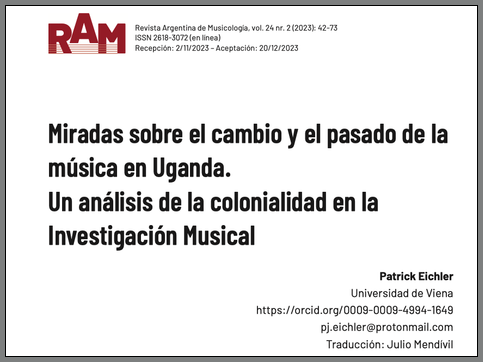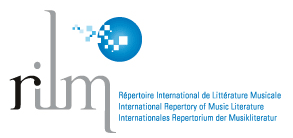Views on Change and the Past of Music in Uganda. An Analysis of Coloniality in Music Research
Keywords:
Uganda, Music, Colonialism, History, AfricaAbstract
This essay, developed from research for the author’s master’s thesis, aims to investigate the presence of issues of the past and historical change in musicological literature on Uganda from the British colonial era. Theoretically grounded in postcolonial discussions of knowledge, power and coloniality, it examines regional manifestations of views on African music that have been developed in Eurocentric knowledge perspectives. For this purpose, a body of mainly textual sources (research publications, reports, newsletters, and other documents) has been analysed and interpreted regarding terminology, concepts, attitudes, and narratives. A special focus is thereby set on the activities and contributions of Klaus Wachsmann from the 1930s to the 1960s. The parts of the investigation’s results that are presented here concern two aspects: on the one hand perspectives on the past of musical phenomena in Uganda and its interpretation through diffusionistic and other narratives; on the other hand, voiced concerns about changes in African musical cultures and supposed loss of traditions or authenticity. In both tendencies, imaginations of humans and music in Africa as fundamental Others to those in Europe become evident, as well as essentialist conceptions of social or ‘ethnic’ affiliation and tradition.

Additional Files
Published
Issue
Section
License
Copyright (c) 2023 Revista Argentina de Musicología

This work is licensed under a Creative Commons Attribution-NonCommercial 4.0 International License.
ATTRIBUTION-NONCOMMERCIAL 4.0 INTERNATIONAL
https://creativecommons.org/licenses/by-nc/4.0/
You are free to:
- Share — copy and redistribute the material in any medium or format
- Adapt — remix, transform, and build upon the material
- The licensor cannot revoke these freedoms as long as you follow the license terms.
Under the following terms:
- Attribution — You must give appropriate credit , provide a link to the license, and indicate if changes were made . You may do so in any reasonable manner, but not in any way that suggests the licensor endorses you or your use.
- NonCommercial — You may not use the material for commercial purposes .
- No additional restrictions — You may not apply legal terms or technological measures that legally restrict others from doing anything the license permits.
Notices:
You do not have to comply with the license for elements of the material in the public domain or where your use is permitted by an applicable exception or limitation .
No warranties are given. The license may not give you all of the permissions necessary for your intended use. For example, other rights such as publicity, privacy, or moral rightsmay limit how you use the material.






